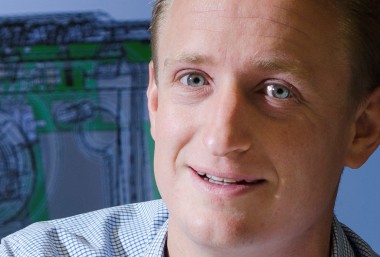Local technology company EROAD is changing the freighting industry in New Zealand, and now they're looking to solve the world’s road-taxation issues.
True - devising solutions to road transportation taxation isn't the sexiest job around. But it's an area where one Kiwi start-up is streets ahead and poised to take its technology to the world.
EROAD has been hard at work developing systems to help fleet-management businesses handle the costs and complexities of New Zealand's Road User Charges (RUC). Under the system, trucks calculate the distance they travel and pay an ongoing licence fee to help fund road maintenance costs.
EROAD's innovative on-board unit (OBU) technology eliminates the risk of non-compliance or interference with measuring devices, and helps companies better manage their fleet.
An electronic dash-mounted unit replaces the old mechanical axle-mounted device used to monitor wheel rotation and calculate distance travelled. Multiple sensors, including GPS, in the OBU measure and cross-check location for accuracy. The data is then sent via the mobile network to secure websites where firms can monitor their RUC and purchase licences.
Additional tools include electronic log books and digital maps with real-time vehicle information. Companies can also calculate fuel consumption, vehicle emissions and idle/stop time. The results: more efficient dispatching, better route planning, timely maintenance, and improved cash flow.
Following an intensive R&D phase, EROAD's technology went commercial three years ago and now captures around 24 percent of New Zealand's RUC. Chief technology officer Bruce Wilson says creating a system that was reliable and accurate has been the focus.
'Our goal is to help transport companies manage their fleets and compliance obligations. We developed everything from scratch - all the distance-recorder hardware through to the web-based application. We've worked hard to ensure the system is scalable, so we can manage the expected business growth and guarantee availability of the network.'
But it hasn't been an easy road. Before being able to market its technology and operate commercially here, EROAD had to obtain regulatory approval, have new legislation passed and work closely with the Ministry of Transport and NZTA.
The significant time and revenue it invested in that part of the process, not to mention product development, has made it essential to have a robust intellectual property strategy to protect its ideas and systems. Early on, EROAD turned to intellectual property specialists AJ Park for advice.
'What's unique about EROAD is the fact they even conceived the idea and decided to take on the challenge of turning it into reality,' says AJ Park partner Matt Devine. 'They had to identify the problem and then try to solve it, versus the often-used business model of creating something and taking it to the market.'
Devine says discussions around IP strategy have always been a key component of his work with EROAD.
'The team at EROAD are talented, energetic and passionate; and they're very receptive to our ideas and advice. They've built the company from the ground up, and overcome many hurdles - not just the usual ones of needing capital and developing good technology, but they've also had to get regulatory approval to replace the existing system with their product. That's required a lot of belief in their idea.'
EROAD values the outsider's perspective that AJ Park can offer, says Wilson.
Startups and small companies need good, cost-effective protection, and AJ Park works with us to achieve that. Matt has been excellent. He gets what we're doing, helps us understand the IP landscape, and can decode the real risks in protecting or not protecting.
- Bruce Wilson, EROAD
After securing a patent for its core idea, EROAD needed to look carefully at protecting some of the techniques related to making its technology secure and tamperproof.
'Our focus wasn't simply on getting patents but also on advising EROAD on the best way to safeguard their trade secrets,' says Devine. 'In terms of their IP strategy, we recommended using New Zealand as the springboard and having a strategy that could be taken to other countries. It was about working in steps, but with the bigger picture in mind.'
The export opportunities for EROAD are immense.
'This year is about growing our business internationally,' Wilson says. 'The rest of the world is crying out for this type of technology. We recently signed up a significant fleet in Australia and we are going commercial in the US later this year.'
'The shortfall in funding for road maintenance is a growing problem in the US and in Europe, where they're looking for innovative technology partners like EROAD to work with.'
Written by Deirdre Coleman, this case study was featured in issue #46 of Idealog. Photo courtesy of Tony Nyberg.
